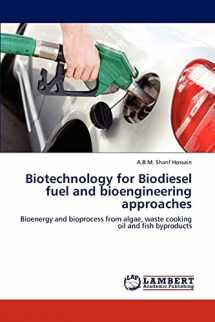
Biotechnology for Biodiesel fuel and bioengineering approaches: Bioenergy and bioprocess from algae, waste cooking oil and fish byproducts
ISBN-13:
9783847347835
ISBN-10:
3847347837
Author:
A. B. M. Sharif Hossain
Publication date:
2012
Publisher:
LAP LAMBERT Academic Publishing
Format:
Paperback
140 pages
Category:
Engineering
,
Biotechnology
,
Biological Sciences
FREE US shipping
Book details
ISBN-13:
9783847347835
ISBN-10:
3847347837
Author:
A. B. M. Sharif Hossain
Publication date:
2012
Publisher:
LAP LAMBERT Academic Publishing
Format:
Paperback
140 pages
Category:
Engineering
,
Biotechnology
,
Biological Sciences
Summary
Biotechnology for Biodiesel fuel and bioengineering approaches: Bioenergy and bioprocess from algae, waste cooking oil and fish byproducts (ISBN-13: 9783847347835 and ISBN-10: 3847347837), written by authors
A. B. M. Sharif Hossain, was published by LAP LAMBERT Academic Publishing in 2012.
With an overall rating of 4.3 stars, it's a notable title among other
Engineering
(Biotechnology, Biological Sciences) books. You can easily purchase or rent Biotechnology for Biodiesel fuel and bioengineering approaches: Bioenergy and bioprocess from algae, waste cooking oil and fish byproducts (Paperback) from BooksRun,
along with many other new and used
Engineering
books
and textbooks.
And, if you're looking to sell your copy, our current buyback offer is $0.3.
Description
Biomass like filamentous algae, waste cooking oil and fish byproducts are considered as suitable materials for biodiesel production due to its readily-availability and cost effective. The studies were conducted to investigate the optimum conditions for biodiesel production using alkaline transesterification bioprocess in combination with methanol, ethanol and 1-butanol. Molar ratio of alcohol to oil (3:1, 6:1, 1:1, 1:2, 1:3, 1:4) and type of catalyst were selected to compare biodiesel fuel produced from algae, waste cooking oil and fish byproducts. The biodiesel was of good quality obtained from waste corn cooking oil and fish byproducts implemented in the engine at 2000 rpm for 2 hours and reduced fuel consumption, engine emission like HC, NOx and CO. The highest biodiesel yield was obtained using 1:3 volumetric oil-to-methanol ratio at 1% heterogenous mixture of catalysts compared to homogenous catalyst. The fatty acid methyl ester, viscosity, total acid number and metal (Pb, Na, Ca, Mg, Cu. Fe) content were under ASTM standard. Biodiesel obtained from algae, waste cooking oil and fish byroducts was of ASTM standard and could be used as a source of diesel fuel in diesel engine.


We would LOVE it if you could help us and other readers by reviewing the book
Book review

Congratulations! We have received your book review.
{user}
{createdAt}
by {truncated_author}


